Peter MALONE
Saturday, 18 September 2021 19:43
Strange Vengeance of Rosalie, The
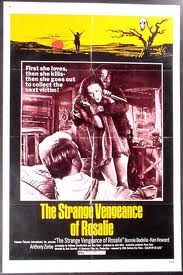
THE STRANGE VENGEANCE OF ROSALIE
US, 1972, 107 minutes, Colour.
Bonnie Bedelia, Ken Howard, Anthony Zerbe.
Directed by Jack Starrett.
The Strange Vengeance of Rosalie is certainly a strange but not untypical film of the early 1970s. Director Jack Starrett, who acted in many films also, directed a number of biker films and then made this film which includes a biker but focuses on a teenage girl who is quite demented. She entraps a travelling salesman, breaking his legs (with many afterwards noting the similarity with Misery, Stephen King’s story). She becomes entangled with a biker who had raped her and goes off with him, finally meeting the salesman again, and committing murders and accusing the salesman of committing them.
The film probably sounds more sleazy than it actually is in its treatment. Bonnie Bedelia was at the beginning of her career, appearing in many films and telemovies, especially as Bruce Willis’s wife in several of the Die Hard films. Ken Howard was also a young actor at the time – and graduated to father roles in later years (In Her Shoes). Anthony Zerbe served as a villain in many films at this time, particularly in The Omega Man.
1. The interest in this kind of film? As thriller, as likable, as repelling? The purpose of the film makers?
2. The significance and tone of the title, and its ultimate explanation?
3. Audience interest in the mystery of Rosalie, the explanation of her background and her type, character, strengths and weaknesses, her hitchhiking and her attractiveness, her seduction and power over Virgil, her cruelty, possessiveness, holding him, fascination with him? Did she have the same fascination for the audience?
4. What had happened to Rosalie? Her grandfather, the gold wine, isolation and madness, sexuality and brutality? How in this illustrated by her dealing with Virgil? By the confrontation with Fry?
5. How was Virgil meant to represent the ordinary man, lured by Rosalie, letting himself be taken in, becoming a victim, suffering cruelty? And yet the fascination of Rosalie, his helping her, his explanation of love and relationships, sexuality? His defending her from Fry? His use of Fry to save himself?
6. The importance of Rosalie’s going to town, buying dresses, her returning and saving Virgil, the irony of this because of her later vengeance? The murder of Fry?
7. The horror and the tension of the final encounter, Virgil as victim again, Rosalie confronting him with the murder of Fry?
8. How could the audience feel for the victimisation of Virgil?
9. Was this an interesting piece of Americana, a thriller, interest in its psychological tones, questions of sanity and madness, love and hate, greed and cruelty, the nature of vengeance, men and women and relationships?
Published in Movie Reviews
Published in
Movie Reviews
Tagged under
Saturday, 18 September 2021 19:43
Stranger in the House
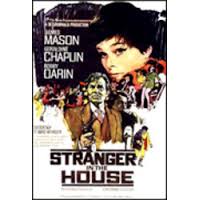
STRANGER IN THE HOUSE
UK, 1967, 107 minutes, Colour.
James Mason, Geraldine Chaplin, Bobby Darin, Ian Ogilvy, Clive Morton, Moira Lister, James Hayter, Megs Jenkins.
Directed by Pierre Rouve.
Stranger in the House is an adaptation of a novel by French detective story writer, Georges Simenon. Many of his Inspector Maigret stories were adapted for television, especially in France. Other adaptations include The Man Who Watched Trains Go By in the early 1950s with Claude Rains and the Hungarian The Man from London by Bela Tarr (2007).
The location for the story has been changed to England. James Mason plays an alcoholic widower who does not know what is happening in his own house, especially with his daughter (played by Geraldine Chaplin) and her boyfriend (Bobby Darin). When the boyfriend is accused of murder, the lawyer decides to take on the case and to get his life back in order.
The film was written and directed by Pierre Rouve, an exile from Bulgaria who went to the UK, wrote a number of screenplays (The Dock Brief), directed this film only and spent most of his time as an art critic and as a broadcaster on the BBC World Service.
1. The significance of the title? The American version was called 'Cop Out’. Is this a more appropriate title?
2. The qualities of the film as a psychological drama, about relationships? The success of the film as a murder mystery?
3. How important was the atmosphere of the small town? The English background, the officials and their business roles in the town? the shop, the knowledge of one another, the atmosphere of scandal etc.?
4. How important was the generation gap as a setting for the psychological drama, as incorporated into the murder mystery? John Sawyer and his not understanding his daughter, the initial sequences about his resentment of
his wife? Why had he not communicated his love for his daughter? The Hawkins family, the Flower family and their non?communication? The sequences with the wildness of the younger generation? Their inability to communicate
to their parents? Angela’s resentment? The contrast in the lifestyles at homes the parties? Mrs. Flower and her affair with the lawyer? What comment did the film make on each of the generations, their good and their bad, the hypocrisy?
5. How was Sawyer the focus of the film? A strong characterisation of a broken man? Audience sympathy for him or not? His moving into the role of the hero solving the mystery? His drinking, his weakness, life at home? His
relationship with Angela? His rudeness to the Flowers and to his other relations? His being challenged by the defence of Joe? The detailed manner of his investigation? Interviewing people in their localities, listening to their memories? The impact of his behaviour in the court and his not speaking? His arrival at the party and the dramatics of his explanation of crime and punishment? How compassionate was he to Desmond?
6. What had Sawyer achieved by the end of the film? The truth, as a breaking of hypocrisy in the town, a relationship with his daughter, an innocent man being saved?
7. The importance of the flashback technique, the accumulation of information about Barney and his relationship to the younger people, the motivation for his murder?
8. How attractive a character was Angela? Her role in the house, resentment of her father, ridiculing him, her memories with the set in which she moved, meeting Barney, loving Joe? Why did she accept Barney into the house?
Her appeal to her father and the reconciliation?
9. How important a character was Joe? His moving in the circles with Angela and Desmond? The importance of his being Greek? The sequences with his mother? The accusation for the murder? Angela's belief in him, the interviews with Sawyer In the prison? His desperation at Sawyer's behaviour in the court? The slights on his being foreign?
10. The presentation of the Flower and the Hawkins families? Their arrogance, their roles in administering justice? Their relationship with he younger generation?
11. How well explored was the character of Desmond? The flashbacks about his impotence? The sequence of the stripper? Sufficient motivation for his murdering Barney? His arrogance in concealing the truth? The impact of crime and punishment on him? What had happened to him in John Sawyer's revelation of his guilt? His future?
12. How interesting a character was Barney? His sudden emerging towards the group? The way that the led them? The way they relied on him? His hold over each of them? His taunting of Desmond? The inevitability of his being murdered? An American and evil influence on these English young people?
13. The cumulative effect of the whole film in terms of interest and suspense?
14. The qualities of the film as a murder mystery, as a social commentary?
Published in Movie Reviews
Published in
Movie Reviews
Tagged under
Saturday, 18 September 2021 19:43
Stranger Who Looks Like Me, The
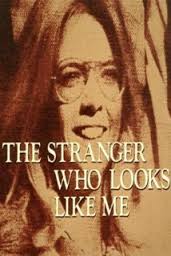
THE STRANGER WHO LOOKS LIKE ME
US, 1974, 74 minutes, Colour.
Walter Brooke, Neva Patterson, Whitney Blake, Woody Chambliss, Ford Rainey.
Directed by Larry Peerce.
The Stranger Who Looks Like Me is a story about adoption. A young woman seeks out her birth parents and teams up with a young man who also was adopted. The film, brief, focuses on issues of adoption, the effect on the children, the legalities and the emotional realities of the search for birth parents.
The film was directed by Larry Peerce who made a number of feature films including The Sporting Club and The Other Side of the Mountain but also made quite a number of telemovies over several decades. The film was written by Gerald de Piego, a prolific writer of screenplays for more than thirty years ranging from Sharky’s Machine to The Forgotten in 2004.
1. The impact of this telemovie?
2. The value of the presentation of such a serious theme in film, on television, for viewing in the home? how powerful? The didactic effect as regards orphans and their emotions?
3. The film's use of television techniques, close-ups, confined spaces, commercial breaks, emotional impact?
4. The significance of the title and its reference to Joanne? The importance of the pre-credit situation, the photo, the family reseblances and the irony of Joanne's being adopted?
5. How well did the film communicate Joanne’s situation? As an attractive young American girl in herself, sympathetic? Engaged? The background of her home, her relationship with her parents? Their love for her and bringing her up? As her true parents?
6. How well did the screenplay present the pros and cons of her searching for her identity, for her parents? What were the main reasons in favour of her search? The main reasons against? The film's explanation of government regulations, legislation? Who has the right to know the facts? And yet the drive within the person to find out? How well did the film show the various angles on people's rights, privacy, the capacity for being hurt?
7. The presentation of the association, its aims, its cause, the nature of discussion about the association? The members and their emphases on themselves and their identity? Identity an an all-consuming cause? The rights of the various people in the discussion group, privacy, ability to cope with children? How were the points of view put forward in the discussion throwing light on the views of the others? What conclusion did the film draw? What conclusions would most audiences draw?
8. The presentation of the hurt to the Denners? Their trying to persuade Joanne not to find out? Her leaving home and leaving them? The years that they had considered themselves her parents and now the questioning of this and the hurt? The phone calls? The sympathy of the parents, the character portrayal of their grief? The welcoming of Joanne when she returned?
9. How important was the character of Chris? An angry young man, the nature of his hang-ups, the explanation of his background and anger? His sharing the search with Joanne after the initial conflict? His need for love, the details of his search, the house, the finding out of details, the Spaldings? The house and the memories? His tears? The confronting of the lawyer, his reactions to Joanne and hurting her? How much insight into the complexities of this kind of character and the situations in which he has been placed by life?
10. The delineation of the people in the association and the varying points of view? The people working at the office, the slow search, the thumbing through phone books, addresses, frustration because of officialdom's negative reaction? The holding of seminars?
11. The details of Joanne's search, her hurt, frustration? Ringing the hospitals? The pros and cons of her persuading the orderly to give her the information?
12. How well handled was the sequence where she met her natural mother? Emma, the woman in herself, being confronted by the truth of her daughter? The need for secrecy? The fact that Joanne had wanted to touch her natural mother and yet eventually did not? The fact that it did not solve all her problems? She said that an emptiness had gone. Was the encounter with Emma and the search for her worth it?
13. The significance of her return to the Denners?' And the bond with Chris?
14. Is this kind of telemovie exploration of such an important social theme, with such psychological implications, a valuable way of the ordinary person learning about such issues?
Published in Movie Reviews
Published in
Movie Reviews
Tagged under
Saturday, 18 September 2021 19:43
Strangers When We Meet
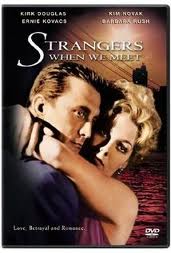
STRANGERS WHEN WE MEET
US, 1960, 117 minutes, Colour.
Kirk Douglas, Kim Novak, Ernie Kovacs, Barbara Rush, Walter Matthau, Virginia Bruce, Kent Smith.
Directed by Richard Quine.
Strangers When We Meet is based on a novel by Evan Hunter who wrote the screenplay. Evan Hunter went on to write the screenplay for Hitchcock’s The Birds. However, Hunter was better known as Ed Mc Bain with his many novels about the 87th Precinct in New York City.
The film is about marriage, fidelity and infidelity. Kirk Douglas plays an architect whose marriage is brittle (with Barbara Rush as his wife) and encounters a neighbour, Kim Novak. Their sons are friends at school. Soon they begin an affair. What seems romantic suddenly becomes tawdry when a neighbour, Walter Matthau, makes advances towards Kim Novak. They have to reassess their situation.
The film is very open for 1960 and indicates the type of treatment that was to come later in that decade for films about marriage, affairs, fidelity and infidelity.
1. The meaning of the title and its tone? The indications of glossy melodrama? The song and the musical score?
2. Why are such films popular with most audiences? The appeal of soap-opera, of a ‘woman's picture’? The cardboard characters and situations? How real or unreal? What value do these entertainments have? Do they help people in understanding human nature, or are they misleadning with their glossiness and contrivance? How do these criteria apply to this film?
3. What moral tone underlay the film? A message about emotions and the clash of human characters? Or did the film tend to exploit these clashes and crises?
4. How important was the American background, the city and suburbs, wealth, the comfortable way of life, boredom, ambition, morality?
5. Comment on the film's emphasis on the particular details of this world, schools, supermarkets, housekeeping, jobs, cafes, parties? How important for the film's success was this accuracy of detail?
6. How sympathetic a hero was Larry? Kirk Douglas’s style, the ordinary man, his home life, relationship with hie wife and children? The importance of his job and sense of achievement? Larry and Roger and all the discussions
about building the home? The emptiness and harshness of Larry's life? Why did he allow himself to be attracted to Margaret? His decision to follow her, her leading him on? The nature of the affair and the emotional involvement? The effect on Larry's life, his lies? His refusal to make decisions? The playing on his sympathy for Margaret, stories of her husband? The importance of the sequence at the party and the acting out of lies? The clash with Felix? The importance of Margaret’s story about her nymphomania? His decision to break, take the job in Hawaii, break completely with Margaret at the house? What insight into the modem middle aged man did this character give?
7. How attractive was Margaret? The initial contrast with her mother, her sense of inferiority, her fears of emotional involvement? Margaret as a mother and wife? Her being the same as her own mother? Her relationship with her husband and his coldness? Why did she enter the affair? How much emotional involvement? Her decision to go to the party, her lies to her husband? The importance of the story of her seduction? What did this reveal about her character? Her being hurt by Larry's breaking off the affair, her choice to continue it and her going to the house? What future would she have?
8. How did Eve contrast with Margaret? How good a wife was Eve, her inability to help Larry,her nagging, her fears? Her attempt to reconcile with the past? The hurting of the truth? Her decision to reconcile? Was this the best?
9. How did Ken contrast with Larry? Ken's ordinary businessman way of life, his Puritanism with his wife?
10. The comment on American morals in the character of Felix? His initial primness, his leering telling of Larry about the affair? the ugliness of his attempt with Eve?
11. The importance of Margaret's, mother: the values and her moral stances, her taunting of her daughter, her pointing out that the daughter was exactly like the mother?
12. What importance did Roger and his way of life have in the film? Roger and his girlfriends, his creative art, the house? The nature of the friendship between Roger and Larry?
13. The sub-plot of art and achievement and creativity? In terms of jobs, in terms of emotions and relationships?
14. How well-made a soap opera was this? The main values it stood for? The value for audience entertainment?
Published in Movie Reviews
Published in
Movie Reviews
Tagged under
Saturday, 18 September 2021 19:43
Strike Force
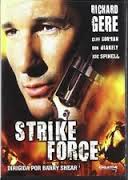
STRIKE FORCE
US, 1975, 73 minutes, Colour.
Cliff Gorman, Richard Gere.
Directed by Barry Shear.
An above average police telemovie. It was the pilot for a series which did not eventuate. The producer was Philip D'Antoni, the producer of The French Connection and director of The Seven Ups. The direction is by Barry Shear, a prolific T.V. director and maker of such cinema features as Wild in the Streets and the police thriller Across 110th Street. The cast is good, the atmosphere and colour photography of New York quite striking. The film is of interest in having Richard Gere, later to make such an impact in Yanks and Days of Heaven and American Gigolo, as one of the members of the strike force. The film reflects the trends of the seventies in popular entertainment concerning police forces.
1. The impact of the telemovie? Its quality in itself, as a pilot for =a series? The production values, qualities. entertainment and interest value? For the home audience?
2. The popularity of the police genres in the seventies? Special Branches, corrupt police? This particular strike force and the focus on drugs, New York? Particular skills, detection, surveillance? The collaboration of the strike force, the F.B.1. and the local police? The credibility of the situations, of this presentation of the police in action? The character studies of the three men involved?
3. Colour photography, New York settings? Police precincts, the Italian section of New York, the streets and homes? The countryside and country estates? New York in the winter? The drug scene and the pushers and dealers? The contribution of the musical score?
4. How striking was the opening in the garbage tip, the killing, the child witnessing the murder? The later killing of the child and his funeral? The shootout at the end in the garbage tip and the poetic justice where the criminals die or are caught in garbage?
5. The entertainment value and interest of the plot? The mystery, the twists, the personal involvement of the men themselves? The characterisations within the plot?
6. The portrait of the criminals - drug men, hired assassins, a gang smoothly operating, syndicate connections? The smart technique of robbing the headquarters of the drugs? The packaging and selling and storing of the drugs? The portrayal of the methods of dealers?
7. The impact of the strike force - its establishment, the hero and his Italian background, the loner, the professional? Seeing him at home? his failed marriage? His contact with the wife of the prisoner, her affair, the man’s death and her reaction? Doing her a favour and he r giving him information? presence at the funeral? knowledge of the Italians around the streets and getting information from them? The humour of the elderly women feeding him up? An authentic flavour in his characterisation?
8. The contract with the F.B.I. man - the black man and his collaboration with the group, his detective skills, his disguises, his involvement in the action? His seeming suspicion of the leader and the mutual distrust, his trying to break through this?
9. The local policeman and his age, experience, lack of experience, his driving, good humour, surveillance in the market, opposite the police headquarters?
10. The building up of suspicions especially within the police force? The authorities and their attitudes?
11. The strength of local colour, side characterisations, the attention to detail?
12. The details of police method - cover, disguise, surveillance, chase, final shootout in the garbage tip?
13. The particularly American tone of this kind of film of the seventies? Audience interest in police work? Police as heroes? The drug situation and the prevalence of crime? The difficulties of administration of the law and justice?
Published in Movie Reviews
Published in
Movie Reviews
Tagged under
Saturday, 18 September 2021 19:43
Stud, The
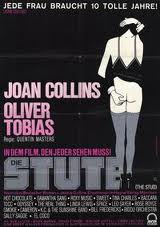
THE STUD
UK, 1978, 95 minutes, Colour.
Joan Collins, Oliver Tobias.
Directed by Quentin Masters.
A rather glossy, ugly picture of contemporary morals and lack of them in England. Based on a novel by Jackie Collins, sister of Joan Collins who plays the leading role, it is the story of a young man-about-town who lacks moral sense and who uses women to further his career without realizing that he is being used himself. The conventional plot material is treated in the 'with it' kind of way. The treatment is rather ambiguous because, while the general point is against the empty worthlessness of the lives of the main characters, it is presented in such a way as to be at least attractive at the moment. The acts, suggestions of immorality, the use of the contemporary songs of 1978-79 for background all highlight this. Direction in by Australian director Quentin Masters who has worked in British television. A film echoing some of the trends of the seventies. It is a record of some of the permissive styles of the times.
1 . The title, the tone?
2. The picture of contemporary society in its glossy ugliness? Sexuality, amorality, people using one another, hedonism? The background of soft core pornography styles? How accurate a picture of this kind of society and its behaviour?
3. The film's point of view: presenting the glossy surface and an amoral point of view, the emphasis on glitter, wealth, success? The film using the styles that it criticises?
4. The title and the credits sequence with the photos and the emphasis on Tony? The photos of all the women around his room? The way that he related to them, used them? The film emphasizing his attraction? Oliver Tobias's appearance, style, way of speaking? The irony of his working class background and relationship with his mother? His being used by Fontaine, managing the club, his pride in this? His relationship with Fontaine, the sequence in the lift and the televising? His relationship to Fontaine's husband? Alexandra’s resentment towards him, his falling in love with her, each using the other? Alexandra being like her stepmother and Tony being the victim? Vanessa and Leonard and their use of him? How much a surface study of this kind of young man-about-town on the make? The critique of his bourgeoise attitudes? His ambitions and wanting to do a deal for the night club? His relationship with the gangsters and his being ditched? Credible situation. character? The point being made?
5. Joan Collins and her glamour as Fontaine? Her wealth and her husband and using him, the lack of relationship with Alexandra? her using Tony and her outings with him? Sexual relationship? Being filmed, using the film, sharing it with Vanessa? Her talk, at the massage parlour with Vanessa? Shopping, parties, Paris and the orgy? The irony of her being found out and her husband's cutting her off? Her survival capacity after being broken, reviving with a new friend? A portrait of a wealthy emotional woman who used people?
6. The contrast with Alexandra at school, fights with her stepmother, her love for her father, her fiance and his insipid behaviour. her relationship with Tony, sexual liaison, inviting him home and humiliating him?
7. A portrait of the wealthy rich, the ‘filthy rich’? The details of business, parties, morality?
8. The contrast with Tony when he was lost, at home with his mother, being taunted? Audience sympathy for him or not?
9. The value in seeing and experiencing this kind of sketch of the world of the seventies? How exploitative was the film?
Published in Movie Reviews
Published in
Movie Reviews
Tagged under
Saturday, 18 September 2021 19:43
Student Prince, The
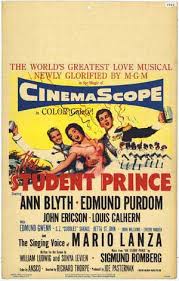
THE STUDENT PRINCE
US, 1954, 107 minutes, Colour.
Ann Blyth, Edmund Purdom, John Ericson, Louis Calhern, Edmund Gwenn, S.Z. Sakall, Betta St John, John Williams, Evelyn Varden, Richard Anderson, voice of Mario Lanza.
Directed by Richard Thorpe.
The Student Prince is based on the operetta by Sigmund Romberg and contains many popular and memorable songs. Ann Blyth had had a dramatic career but in the early 1950s had moved into musicals, The Great Caruso with Mario Lanza, Rose Marie with Howard Keel and Fernando Lamas, Kismet with Howard Keel and Vic Damone. She also starred with Paul Newman in The Helen Morgan Story. Edmund Purdom, who had appeared in The Egyptian, was the leading man because Mario Lanza had put on so much weight and was considered unsuitable for the role. However, the voice of Mario Lanza was used for all the songs. There is an entertaining supporting cast including Louis Calhern and Edmund Gwenn. Betta St John is the princess whom the prince is supposed to marry while Ann Blyth is Katie, who works in a tavern, and is his true love.
The film is light, has many of the popular themes of this kind of Central European operetta with its royalty and arranged marriages. The direction is by Richard Thorpe, better known for action films. At this time he made The Knights of the Round Table and Quentin Durward with Robert Taylor.
1. Was this a well made and enjoyable musical? What conventions of the musical were most used? How well?
2. The use of Cinemascope and colour, nineteenth century settings and romantic background? Audience response and satisfaction?
3. The importance of the music and song for the film? The operetta atmosphere for character expressed in the songs? Did the songs contribute to the plot?. How? Which songs were most impressive? Enjoyable? Why? The contribution of Mario Lanza’s voice and the use of Edmund Purdom as actor?
4. The fairy tale overtones of the film? The prince as commoner? His transformation by commoner? Why do people respond to this fairy tale atmosphere even in reverse?
5. How attractive a hero was Prince Carl? His stuffiness at home, his need for learning warmth to be king, his priggishness at university, his need for fellowship, the breaking down of barriers, his response to Kathy and an emotional response in life? His need for responsibility in order to be king? The impact of his father's death
and his return to court? Would he be a successful king?
6. Was Kathy an attractive heroine? Was it clear that the romance could come to nothing? Her role in the inn and the choices open to her? Her renunciation of love for Carl?
7. The aristocrats at the university? Were they stereotypes or enjoyable characters?
8. How much comedy and pleasant relief was provided by the tutor, the valet, the inn keeper?' How importanyt is comedy for operettas like this?
9. Audience response to nineteenth century monarchy? The king? And the role of kings?
10. Does the film seem dated? Does it seem conventional? Is it still enjoyable?
Published in Movie Reviews
Published in
Movie Reviews
Tagged under
Saturday, 18 September 2021 19:43
Study in Terror, A
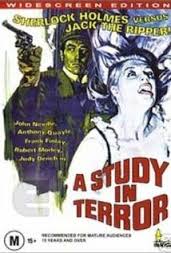
A STUDY IN TERROR
UK, 1965, 95 minutes, Colour.
John Neville, Donald Houston, Robert Morley, Anthony Quayle, Judi Dench, John Fraser, Barbara Windsor, Adrienne Corri, Frank Finlay, Barry Jones, Cecil Parker.
Directed by James Hill.
An imaginative story combining Sherlock Holmes and Dr. Watson with Jack the Ripper. There was a great resurgence of interest in Sherlock Holmes during the 1970s with such imaginative films as The Seven Per Cent Solution in which Freud treats Holmes and Murder By Decree which takes up again the story of the Ripper and Holmes. There was a satire, The Adventures of Sherlock Holmes's Smarter Brother and earlier in the decade Billy Wilder had made The Private Life Of Sherlock Holmes with Robert Stevens and Colin Blakely. There were the regular Sherlock Holmes stories and remakes through most of the decades since talkies.
This film has John Neville as an acceptable Holmes and Dr. Watson is played blusteringly by Donald Houston. There is a guest appearance by Robert Morley as Mycroft Holmes. The English supporting cast for this film is excellent with Anthony Quayle and Judi Dench leading it. A curiosity item is that Frank Finlay plays Inspector Lestrade and plays the same role in the 1979 Murder By Decree. There are some horror elements and some gore in English horror style. All in all, an entertaining and interesting speculative thriller.
1. The popularity of Sherlock Holmes and the tradition of films about him? His appearance, style? His detection and methods? Mannerisms? The support of the blustering Dr. Watson? Dr. Watson's participation in the investigations. his writings? The popularity of Conan Doyle's stories? Further stories made up about Holmes and Watson?
2. The interest in Jack The Ripper? The speculation as to his identity? The horror of his murders in the 19th century? The interesting blend of Holmes and the Ripper?
3. How plausible was the solution? The identification with Royalty? The motivation? The cover-up? Audience curiosity? The recreation of the Victorian era?
4. The atmosphere of Whitechapel, the streets, the hotel, the police, the hospital, the world of Parliament and Royalty, the nobility and the Duke of Shiers and his estate? Colour photography, the sets, costumes and decor? An authentic atmosphere of the times? The songs sung in the pubs and the entertainment? The people of Whitechapel, the prostitutes? The contrast with aristocracy?
5. The film's use of violence, shocks, blood? The editing for pace and shock? Realism?
6. The presentation of the Ripper murders? The streets of Whitechapel, the prostitutes in action and their deaths? The hotel, the singer, the clientele? Holmes and Watson visiting the bar? Steiner and his running of his hotel?
7. The character of Holmes, his style? Seeing him at work, his discoveries? Relaxations? Relationship with Inspector Lestrade? With his brother Mycroft? Watson and his function as chorus? Admiration? The device for the screenplay of Holmes spelling out the details of his investigations and discovery? Watson's participation in the work? Inspector Lestrade and Scotland Yard? Mycroft and the Prime Minister and the commission?
8. Dr. Murray and his role as surgeon, a suspect for being the Ripper? His assistant and his madness and the revelation of the truth? Sally and her support of Dr. Murray? The link with Lord Carfax? The detail of his work, the examination of the corpses and the autopsies? His involvement? His character and the truth about him? The character of Sally and her support?
9. The Duke of Shiers and his arrogance, cutting off his thumb?
10. Lord Carfax and his interest in his brother, his relationship with Sally, his innocent appearance? His help? The revelation of the truth and his madness? Audience surprise at the revelation about him?
11. Steiner and Angela and their plan, the tools sent to Holmes, the discovery of the truth? Steiner and his brutality? Angela and her disfigurement? Her cruelty towards Michael? The blackmail? Their being destroyed with Lord Carfax in the fire?
12. How well did the screen play provide clues? The details of Holmes's investigation and his method?
13. How satisfying a period entertainment? Thriller? Audience speculation and curiosity? Audience interest in Sherlock Holmes? The Ripper - how satisfying was the film for audience response?
Published in Movie Reviews
Published in
Movie Reviews
Tagged under
Saturday, 18 September 2021 19:43
Stunts
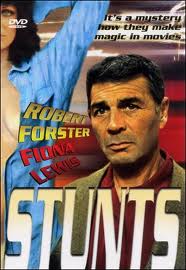
STUNTS
US, 1977, 89 minutes, Colour.
Robert Forster, Fiona Lewis, Ray Sharkey, Joanna Cassidy, Bruce Glover, Richard Lynch.
Directed by Mark L. Lester.
Before computer graphics there were stunts. Peter O’ Toole appeared in Richard Rush’s film The Stunt Man and there was an Australian documentary with Grant Page about stunts.
This is a straightforward film with a touch of the murder mystery. Robert Forster portrays a stunt man who takes the place of his brother in the making of a film – his brother had mysteriously died during a stunt. There are scenes of film-making as well as stunt work itself. It fits into the action genre so popular in the 1970s. The director is Mark L. Lester who made exploitational films as well as The Class of 1984 and Commando, with Arnold Schwarzenegger.
1. An entertaining thriller? The focus on film-making and especially stunt work? Murder mystery? How well did those ingredients blend for popular entertainment?
2. How well did the film use the conventions of a film about movie-making - situation, language, spectacular sequences? The conventions of the murder mystery and detection? Revenge? The convention of the newspaper reporter and the variation with the woman psychologist?
3. Colour photography, vocations? Music? How important were the special effects and the great deal of attention given to the various stunts especially with the cars, the scaling of walls etc.? (and the way that these were worked into the plot especially for the attempts on the hero’s life, the wrong people being killed?
4. How plausible was the plot? the part about the film-making and the personalities involved, the difficulties, the hopes for a successful film? Stardom for leading ladies, the skill of the stunt men? The emotional tangles that ensue? The arrival of the psychologist and her study of the stunt men for her article? The background of the murder mystery? Were they sufficient for the purposes of this kind of entertainment?
6. How interesting a character was the hero? His strengths and weaknesses of character, his personality? his skill at his work, friendships? Emotional and romantic situations? hostility to the reporter and his later reliance on her? His confrontation with the film people? The revelation of the truth about the murders?
7. The contrast with the lady journalist? Her educational background, her curiosity, her manner of interview? Her attitude towards the thrills? Her becoming involved in the plot, emotional involvement? A credible kind of character - or at least sufficient for this kind of film?
8. The supporting characters: the film director, the leading lady and the background of promotion, stardom? The follow stuntmen and their role in their work? The revelation of emotional entanglements violence and death?
9. The impact on the audience of seeing the background of the stunt work? As it finally finished up in the film, the risks for the people doing it? The thrills and excitement for the people involved, for the spectators?
10. Which were the most memorable sequences - in terms of stunts, for the development of the plot?
11. How well did the film present conventional themes of good and evil, heroes and heroines, violence? Vicarious excitement? The film’s comment on the making of films and movie-makers? An enjoyable thriller?
Published in Movie Reviews
Published in
Movie Reviews
Tagged under
Saturday, 18 September 2021 19:43
Seven Nights in Japan
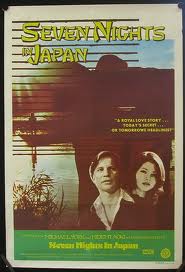
SEVEN NIGHTS IN JAPAN
UK, 1976, 104 minutes, Colour.
Michael York, Hidemi Aoki, Peter Jones, Charles Gray, Yolande Donlan, James Villiers.
Directed by Lewis Gilbert.
Seven Nights in Japan was allegedly based on Prince Charles. It tells the story of a prince who gets away from Europe by visiting Japan and falls in love with a tour guide (Hidemi Aoki). There is a subplot about an assassination attempt on the prince.
The film has the light touch, is romantic, is very much a tourist film of Japan. It was written by Charles Wood who wrote four of the Confessions of … series as well as two James Bond films, The Spy Who Loved Me and Moonraker. It was directed by veteran Lewis Gilbert who directed a number of stiff-upper-lip British films of the 1950s and also directed a number of James Bond films including You Only Live Twice. Michael York fits the part of the prince.
1. An entertaining British soap opera? For whom was the film made?
2. Japanese scenery, locations, the picture postcard tone of the film - appropriate or not for this kind of film?
3. Expectations of the characters and the incidents from the actual royal family of England? How well did the film represent the parallel situations, Prince George and Prince Charles, the various pressures on the Prince, his behaviour? (Did the screen-writers have the right to make such parallels - in good taste, fairly?)
4. The treatment of the film: mocking, serious, comic, mock-serious, romantic, sentimental? The assassination attempt sequences? How well did the film blend the various approaches to its plot and characters?
5. The introduction of the Navy, its responsibility, Prince George's place there, the naval characters especially the Captain? The contrast of life on the ship with royal visits, inspections? Protocol and decorum? The transition to the Ambassador and his family, his wife and her idea of entertaining, Jane and her down-to-earth attitudes?
6. Michael York’s style as Prince George? As a person, as a member of the royal family? His coping with protocol, parades, good manners, inspections, factory visits?
7. The portrait of royal receptions and the types there? The hoped-for romance with Jane? Jane’s later help for the Prince in his difficulties?
8. How relieved was the audience when the Prince escaped from the Ambassador's house? His visit to the Ginza district, the night clubs, the bogus champagne, the fights, his not having any money? His escape?
9. The introduction to Sumi? The tourist bus, her song? Her hospitality but her not inviting him to her bed? The change with his reappearance, the tour, the second night?
10. How deep was their love? The repercussions of his leave? (The phone calls to his mother?)
11. The idyllic time in Kyoto? The house and her introduction to it? The children, their love? The romantic style, the scenery, the lush atmosphere, Japanese customs?
12. How well portrayed were the characters of George and Sumi? Did they develop during the film or did they follow expected lines? Sumi’s response to George as a person, not knowing his identity?
13. How was the end of the affair inevitable? Sumi’s discovery of his identity, her decision to leave, her attitude towards his duty? The effect on George? His return, his gratitude towards Sumi?
14. How interesting was the sub-plot about the assassination attempts and the attempts at action drama? How well were they integrated into the rest of the film? The comic touch even though intended to be serious?
15. Sentiment in the car passing with George in full regalia and Sumi at her work? The significance of the glance and final contact?
16. How much was the film a fantasy, a modern fairy story blended with the harsh expectations of reality? Escapism, a pleasant and enjoyable ‘woman's film’?
Published in Movie Reviews
Published in
Movie Reviews
Tagged under